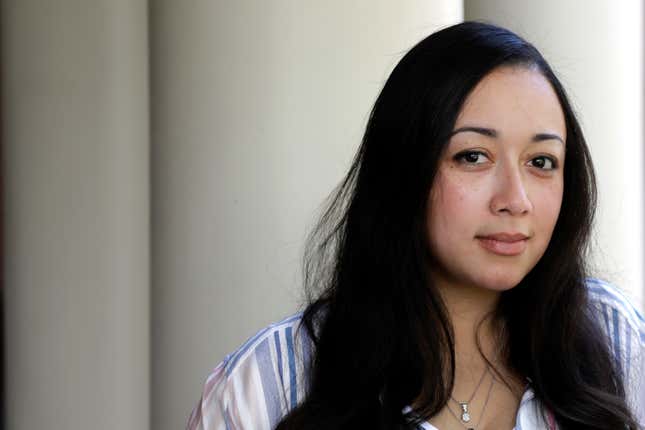
Cyntoia Brown-Long, freed in August after spending half her life behind bars for killing the man who had trafficked her for sex, vowed upon her release to work on behalf of other survivors of sexual abuse and exploitation. In the months since, Brown-Long has been a fierce public advocate for these women and girls, particularly those who find themselves trapped in a justice system that too often criminalizes their attempts to survive.
This week, Brown-Long penned a focused, urgent op-ed in the Washington Post in support of one such victim, 17-year-old Chrystul Kizer, a Wisconsin girl accused of murdering the man who allegedly trafficked her and about a dozen other black girls.
“It is now painfully clear to me that my clemency has not translated into larger-scale change,” Brown-Long wrote in the article, published on Christmas Eve. “As I spend my first holiday season at home since my release, many women languish in prison cells as a result of the same laws and practices that affected me.”
Brown-Long, who founded the juvenile justice advocacy program GLITTER (Grassroots Learning Initiative for Teen Trafficking, Exploitation, and Rape), paid specific attention to the need to reform laws around child sex trafficking. She pointed out that while cases like hers and Kizer’s have drawn national attention, many more girls have suffered similarly in cases that will never gain public recognition. She writes:
We know about the 14-year-old trafficking victim, identified in HuffPost by her nickname “Lici,” serving 20 years in Texas. We know about Alexis Martin, a 15-year-old serving 21 years to life in Ohio for playing a role in the killing of her trafficker. Now, thanks to reporting by The Post’s Jessica Contrera, Kizer is in our timelines. But how many others are out there? And how do we advocate in a way that reaches beyond the few to the many?
For every injustice we see in the criminal-justice system, there is a law, practice or policy that allowed it to happen. That is where the change must happen. In Kizer’s case, a loophole in the law allowed a judge to deny her the ability to use an “affirmative defense” — the option to argue that she should be acquitted because the crime occurred as a result of her being trafficked. Now, unless her appeal is successful, a law specifically designed to protect victims of sex trafficking simply would not apply to Kizer. It is only when we bring the cracks in the system to light that we can effectively lobby to close them. It is only in closing these cracks that we can ensure justice for all.
In her piece, Brown-Long cites a 2016 Vera Institute report which found that 86 percent of all imprisoned women have experienced sexual violence in their lifetime; 60 percent of women in jail specifically reported caregiver violence, which is abuse at the hand of a parent, guardian or other authority figure.
“I, too, was assaulted by a man who told me that I needed to prostitute myself to survive. I know my situation was far from unique,” Brown-Long writes.
In previous interviews, Brown-Long has been transparent about how she didn’t fully come to grips with the abuse she suffered until she was in her 20s.
“It took many, many years,” Brown-Long told CBS News in October. “For so long, you know I had thought, ‘No, they said that I was a teenage prostitute. I knew what I was doing.’” When Brown-Long was a teenager, her boyfriend sold her to other men for sex.
Kizer’s case has received an onslaught of attention this month after a Post investigative report on the killing.
As the Post reported, Kizer’s alleged abuser, 34-year-old Randy Volar, was arrested and charged with child enticement, second-degree sexual assault of a child, and using a computer to facilitate a child sex crime months before Kizer killed him. Despite the fact that he was suspected of human trafficking and child pornography—and a mountain of evidence, including photos and statements from one of his alleged victims—he never once spent a night in jail (Kizer’s photo was among those police found in Volar’s possession).
Responding to criticism about the way he’s handled the case against Kizer, Kenosha County District Attorney Michael Gravely stood his ground on social media, writing a “lengthy statement” on his Facebook over the weekend, according to the Kenosha News.
“I am respectfully asking folks who are interested in the Chrystul Kizer case to reserve judgment until the facts are presented in court at trial,” Graveley wrote, adding that he refused to base his decisions on public pressure.
On Monday, Gravely said he published his statement on social media because of all the interest his office had fielded regarding the case. Some of those messages were questions about the case, he said, others called on him to drop the charges against Kizer. Some were threatening, Graveley said.
A GoFundMe started by Kizer’s mother, Devore Taylor, recently hit its $10,000 goal to help Kizer as she awaits trial (she’s currently being held on $1 million bail). A petition on Change.org calling for the charges against her to be dropped amassed more than 75,000 signatures as of Thursday afternoon.
If convicted, Kizer faces a mandatory life sentence. The trial is scheduled to begin March 16.
But, as Brown notes, the fight to free Kizer is bigger than one case. Ensuring that other victims of child sex trafficking have access to an “affirmative defense” could ensure protections for future survivors of abuse.
Brown-Long writes: “It is our responsibility to become stewards of a system that exists to serve, and not to subject. That responsibility involves looking past the emotions, digging into the details and committing ourselves to advocating for change that affects everyone—not just the names we know.”

